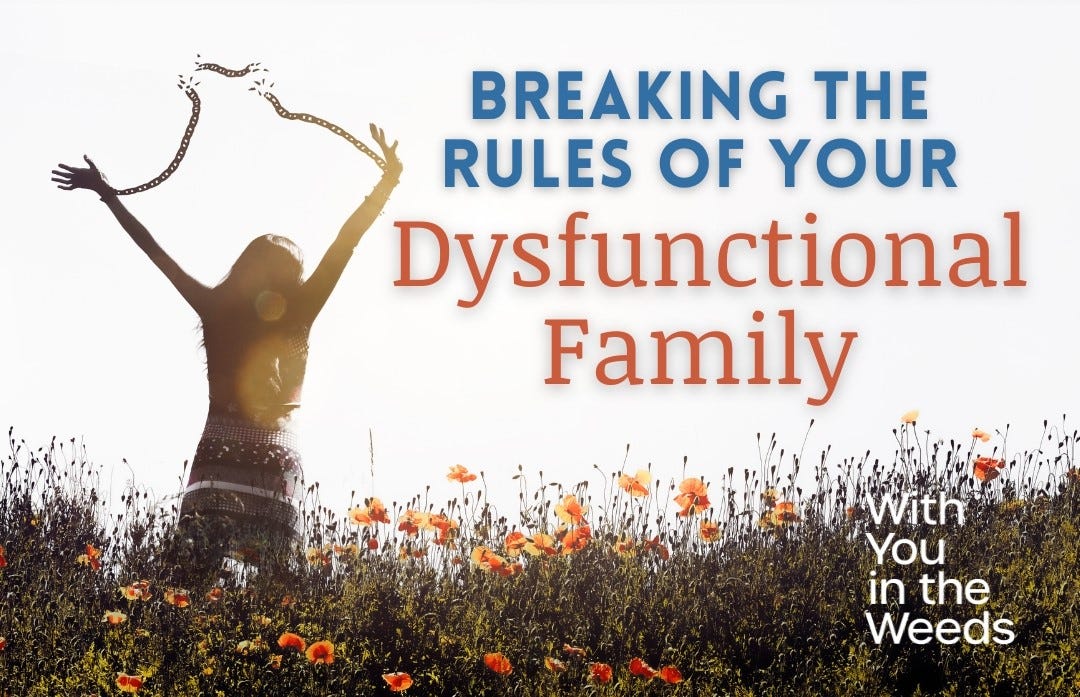Breaking the Rules of Your Dysfunctional Family
How do you change unhealthy family patterns?
Listen now: Breaking the Rules of Your Dysfunctional Family - Series 7, Ep 2
Many clients are motivated in therapy because they don’t want to pass on the hurt they experienced in their childhood. If that’s you, then you’re in the right place to learn how to break the three rules of a dysfunctional family: Don’t talk, Don’t trust, Don’t feel. In the second episode of our new series, Managing Your Dysfunctional Family, John, Lynn, and Austin offer 5 steps you can take to stop the generational cycles of dysfunction you may have in your family.
As therapists, something we often hear from clients is, “No one in my family wants to talk about our problems.” Yep, that’s Rule #1! So for you to break free from these patterns, you’re going to need to break some of those family rules!
Here are five steps to break those rules and FORGE your own path:
Figure out what’s going on
Own your own stuff
Realistic expectations for change
Get help
Establish healthy boundaries
Figure out what’s going on
If you want to break the destructive cycle of family dysfunction, it starts with the basic step of gathering information about family patterns. Taking this step means that you are deciding that you are going to stop pretending, and you are choosing to get out of the comfort zone of denial.
The reason why this is challenging is because most often we insulate ourselves with many protective layers of minimization, justification, and rationalization over the depth of pain and dysfunction in our family. With the emotional support of a trusted spouse, friends, or a counselor, it may be time to be honest about what has gone on in your family and face painful realities.
Own Your Own Stuff
You can’t control others, but if you identify your own role, you can change yourself. As you grow into adulthood you take increasing responsibility for what you control - your actions, desires, thoughts, emotions, responses, and choices. When you can start to “name” your contribution to a family problem, then you can start doing something about it. This is empowering.
A few key questions to ask as you start to “own your stuff”: What impact have the dysfunctional patterns had on me? Am I particularly fearful? Am I a perfectionist? Do I enable harmful behavior in my closest relationships? Do I carry unacknowledged anger? Do I seek to escape pain in the same ways that were modeled to me? What am I already passing on to my friends, spouse or children?
Realistic Expectations for Change
First, be realistic about what needs to change…if you’ve got a highly conflicted family, the goal isn’t to get rid of conflict completely. That’s unrealistic. A more realistic expectation would be to change how conflict is dealt with. This involves accepting that you can’t fix, change, or control anyone else. You can only control how you engage - or don’t engage - in the family conflict.
Second, be realistic about the pace of change…it takes time for personal healing to occur and for relationships to heal and grow. Be patient with yourself as you go through this process and understand that there may sometimes be setbacks even as you’re moving forward.
Get Help
If you grew up with the “Don’t Talk, Don’t Trust, Don’t Feel” rules, then asking for help is seen as a big no-no. But admitting that you need help to deal with your family background is a step of spiritual and emotional maturity. We think this is a very HEALTHY step and it breaks the “Don’t trust” rule.
Seeking support from a trusted friend, church community, mentor, or counselor will help you break dysfunctional patterns and cycles. Healing from family issues usually happens in the context of healthy relationships, which you may not be able to find within your family of origin.
Establish Healthy Boundaries
Christians tend be confused about boundaries because we do not understand the many facets of biblical love – and we had poor models to show us what genuine “truth in love” looks like. Some of us believed the lie that we should always be nice and make everyone happy because that’s the “loving thing to do”.
If you’re new to the concept of boundaries, we recommend the book Boundaries: When to Say Yes, How to Say No to Take Control of Your Life by Henry Cloud and John Townsend. This book will walk you through the process of identifying areas in your life that need boundaries, how to set them, and why it’s godly to do so. As Dr. Cloud says, “Good neighbors have fences”.
Forge New Patterns
Healing from family dysfunction is a lifelong pursuit for everyone, no matter what kind of home you were raised in. Spiritually and emotionally mature people are able to deeply reflect upon themselves and how their family has impacted them: for good or bad. They honestly pursue answers to core life questions and build healthy connections with others.
Resting in the abiding hope of the gospel – that God is WITH you and FOR you – is the key to accomplishing this.
This is one of the reasons why the work of therapy can be so rewarding and have lifelong, generational implications for our clients. So keep these points in mind as we work through our series and be encouraged that you can begin to FORGE new patterns!
Do you enjoy listening to With You in the Weeds? Share this post with a friend and let them know how they can hear substantive content from our experienced team on common counseling questions.
Follow us on Instagram and Facebook and listen on Apple Podcasts or Spotify. Check out our Podcast Topics page for a library of episode content on topics that matter to you, and email us at:




